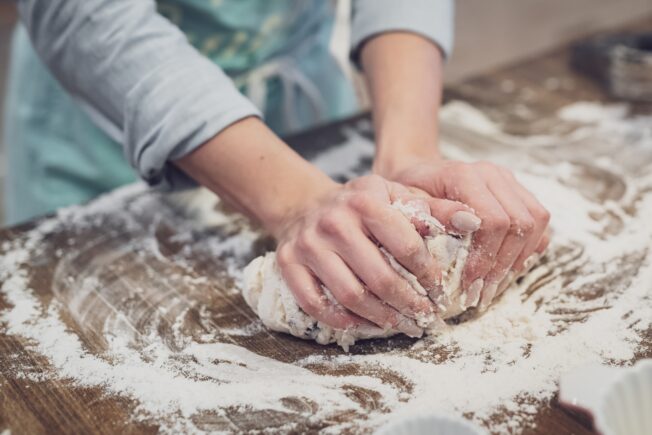Examinations are a crucial part of the educational journey, marking significant milestones in a student’s academic life. While they are designed to test knowledge and skills, they often bring with them a heavy weight of expectations, both self-imposed and external. This, in turn, can cause a significant amount of stress, affecting not just academic performance but also overall well-being. 
In search of respite, many students experiment with various stress-relief methods, ranging from exercise to meditation. Among these, an unconventional but increasingly popular approach is emerging: baking. While the kitchen might seem a world away from textbooks and lecture halls, the therapeutic act of baking offers a unique combination of mindfulness, creativity, and sensory pleasure, making it a perfect counterbalance to the rigors of examination season.
As services like Paperwriter assist students with academic pressures, so does baking help soothe frazzled nerves. Both, in their unique ways, offer a pathway to achieving balance, highlighting that academic excellence need not come at the cost of mental well-being.
The Psychology of Stressful Exams
Every student, at some point in their academic journey, grapples with the overwhelming sensation of stress. But what fuels this feeling? At its core, exam stress is an offshoot of the fear of failure. The anticipation of not meeting one’s own expectations or those of peers, parents, and teachers can be paralyzing. Coupled with the sheer volume of material to be covered and the competitive nature of academic environments, it’s easy to see how stress becomes an unwelcome companion during exam times.
Societal expectations play a role, too. Success in exams is often equated with future success, placing an immense burden on young shoulders. The narrative that exam results can make or break futures can be a hard one to shake off, making every study session feel heavy with significance.
This stress isn’t just a fleeting feeling. It has tangible effects. Short-term symptoms might include sleep disturbances, lack of concentration, irritability, and even physical manifestations like headaches or digestive problems. If left unchecked, chronic stress can have long-term implications, affecting mental health and overall well-being.
Baking as Mindful Meditation
At first glance, baking might seem a world away from traditional stress-relief methods. But delve a little deeper, and the parallels with meditation become clear. Baking is, in essence, a meditative act. The process demands focus and presence. When measuring ingredients, kneading dough, or meticulously decorating a cupcake, the outside world fades away, leaving only the task at hand.
Much like in meditation, where one focuses on the breath or a specific mantra, in baking, the tactile elements take center stage. The softness of flour, the rhythmic motion of whisking, and the smell of ingredients melding together can ground and center the mind. These sensory experiences pull the individual into the present moment, silencing the cacophony of exam-related anxieties.
Furthermore, certain tasks in baking, such as the repetitive action of rolling out cookie dough or the delicate process of piping icing, can have an inherently calming effect. When engaging in these tasks, the mind finds a rhythm, offering a reprieve from the relentless pace of revision and study. In this sanctuary of the kitchen, many students discover a haven, a place where they can reclaim a sense of control and peace amidst the chaos of exams.
The Creative Outlet of Baking
Amid the black and white world of right answers and stringent exam criteria, baking offers a palette of colors and infinite possibilities. It’s an art form that lets students channel their creativity, giving them a canvas where there’s no right or wrong. Each ingredient, each flavor combination, and each decoration allows for personal expression. When hours have been spent poring over textbooks, the chance to create something, to experiment and innovate, becomes a refreshing change.
Additionally, there’s an undeniable sense of satisfaction in witnessing raw ingredients transform into delightful treats. This transformation mirrors the larger journey students embark upon, from absorbing information to producing results in exams. However, the immediacy of baking results, as opposed to waiting for exam grades, provides an instant boost of confidence and achievement.
The decorative elements of baking, such as cake designing or intricate cookie patterns, further emphasize its artistic side. For students from more analytical or theory-heavy courses, this could be the artistic outlet they never knew they needed, a break from linear thinking and a dive into the world of aesthetics and creativity.
The Chemical Reaction: Endorphins and Baking
It’s no secret that indulging in sweet treats can lift our spirits, but the actual act of baking brings about its own set of chemical reactions in the body. Accomplishing a task, especially one that requires attention to detail, like baking, induces a sense of satisfaction. This feeling of accomplishment releases endorphins, the body’s natural ‘feel-good’ hormones. Endorphins act as analgesics, which means they diminish the perception of pain. They also act as sedatives, helping to relieve stress and improve mood.
Apart from the endorphins released during the baking process, there’s also the sensory pleasure of tasting. Sweets, especially chocolate, are known to cause the brain to release serotonin, a neurotransmitter responsible for mood regulation. This chemical boost, combined with the tactile engagement of baking, provides a potent antidote to the anxieties that exams can trigger.
 Building Life Skills Beyond the Books
Building Life Skills Beyond the Books
While baking is often seen as a hobby or a therapeutic activity, it imparts valuable life skills. For one, precision is crucial in baking. A slight miscalculation in ingredient measurements can drastically change the outcome. This attention to detail can transfer to a student’s academic life, reinforcing the importance of precision in answering exam questions or conducting research.
Time management, a skill every student needs, is another lesson from the kitchen. Just as baking requires careful timing to ensure that a cake isn’t undercooked or burnt, studying effectively requires managing one’s hours to cover all topics thoroughly.
Moreover, there’s the lesson of resilience. Not every baking endeavor is a success. Sometimes, a cake might not rise, or cookies might burn. These failures teach students to accept, adapt, and try again, a mindset invaluable in both academics and life. After all, just as one failed recipe doesn’t define one’s abilities as a baker, one poor exam result doesn’t define one’s worth or future success.
Social Aspects: Baking as a Communal Activity
Baking, while often a solitary act, can seamlessly morph into a communal activity. Sharing freshly baked goods with roommates, friends, or study groups not only provides a tasty treat but also an opportunity for social interaction. This sharing can be a conversation starter, a reason for students to gather, take a break, and foster connections.
Moreover, baking with others adds another layer of enjoyment. Organizing small bake-offs with peers or simply coming together to try out a new recipe can foster teamwork and collaboration, qualities essential in various aspects of life. On many campuses, baking clubs or groups emerge, offering a platform for like-minded individuals to bond over their love for the craft. In essence, baking can act as a bridge, alleviating feelings of loneliness and forging new friendships.
Practical Tips for Baking During Exam Season
While the therapeutic benefits of baking are numerous, it’s essential to approach it practically during the hectic exam season. Here are some ideas.
- Use simple and quick recipes: While elaborate cakes might be tempting, sticking to straightforward recipes can ensure baking remains a stress reliever and not an added burden.
- Try baking breaks: Integrate short baking sessions as breaks during lengthy study marathons. This ensures a balance between work and relaxation.
- Practice mindful eating: While indulging occasionally is fine, be conscious of what you’re consuming. Opt for healthier baking alternatives when possible to maintain physical well-being.
Final Thoughts
The rigors of academic life, especially during exam season, can be overwhelming. While services like the best paper writing service can assist in navigating the academic maze, it’s also essential to find personal ways to cope and find balance. Baking, as explored in this article, offers students a multi-faceted approach to stress relief, blending the worlds of mindfulness, creativity, social interaction, and tangible achievement.
In the end, it’s not just about the cakes or cookies that come out of the oven but the journey of crafting them. This journey can be a beacon of solace for students, a testament to the fact that there are numerous pathways to well-being, and sometimes, they can be found in the most unexpected places, like a kitchen. Embracing baking can provide a much-needed respite, adding a sprinkle of joy to the demanding life of a student.

